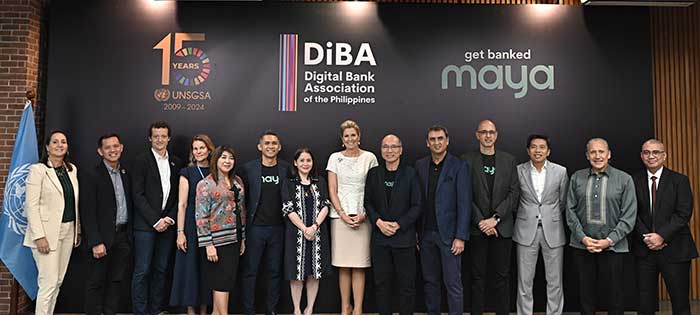
By Francis Allan L. Angelo
In a roundtable discussion featuring UN Special Advocate Queen Máxima and the Bangko Sentral ng Pilipinas (BSP), the Philippines’ six licensed digital banks committed to enhancing the financial health of Filipinos through innovative banking services.
The Digital Bank Association of the Philippines (DiBA PH) reaffirmed this pledge during the event, which was organized as part of Queen Máxima’s visit to the Philippines in her capacity as the United Nations Secretary-General’s Special Advocate for Inclusive Finance for Development (UNSGSA).
The roundtable aimed to foster collaboration between the digital banks and the BSP to advance financial health initiatives and develop new metrics for progress.
Angelo Madrid, President of DiBA PH and Maya Bank, highlighted the progress made in digital banking: “Millions of Filipinos now own a financial account thanks to e-wallets. The next big challenge is here, and in less than two years of operations, safe and reliable digital banking is proving that we can help Filipinos use their financial accounts to improve their financial health. We are committed to providing better experiences, safety, and privacy through digital technologies.”
According to the UNSGSA Financial Health Working Group, financial health involves the ability to manage financial obligations smoothly, absorb financial shocks, stay on track with future goals, and maintain confidence in financial stability.
“Enhancing the financial health of our customers is intrinsic to digital banking, and we are dedicated to advancing this agenda. In the short term, we support conducting a national survey and developing complementary internal metrics to measure our impact on the financial health of our customers. Beyond that, we continue to deliver groundbreaking innovations that empower Filipinos to make bolder financial choices,” Madrid said.
The roundtable featured key industry leaders including GoTyme Bank President and Co-CEO Nathaniel Clarke, GoTyme Bank Co-CEO Albert Tinio, Overseas Filipino Bank Officer-in-Charge Atty. Reo Andarino, Tonik Digital Bank Vice Chairperson Ma. Lourdes “Long” Pineda, UnionDigital Bank President and CEO Henry Aguda, and UNO Digital Bank President, CEO, and Founder Manish Bhai.
Representatives from Queen Máxima’s Reference Group, such as the World Bank and Better Than Cash Alliance, also participated.
DiBA PH’s renewed commitment comes amid significant strides in financial inclusion in the Philippines.
The BSP’s 2021 Financial Inclusion Survey reported that the number of adults with a financial account surged from 29% in 2019 to 56% in 2021, driven by the adoption of e-wallets.
However, challenges remain as only 4% of adults borrow from banks, and a majority still keep their savings at home or struggle with financial resilience.
In response, digital banks are launching products to foster healthier saving habits and increase credit access. These include higher interest rates on deposits and goals-based accounts that encourage incremental savings.
As of December 2023, the digital banking sector saw a 26% growth in its depositor base, compared to a 4% increase across the broader banking system. Additionally, alternative credit scoring models have helped expand credit access, with the total loan portfolio rising to nearly Php25 billion from 2022 to 2023.




















